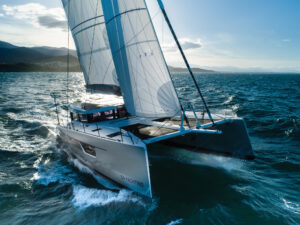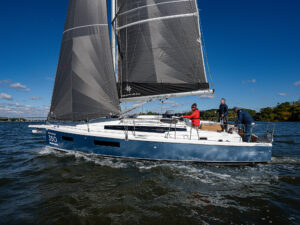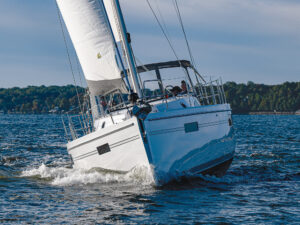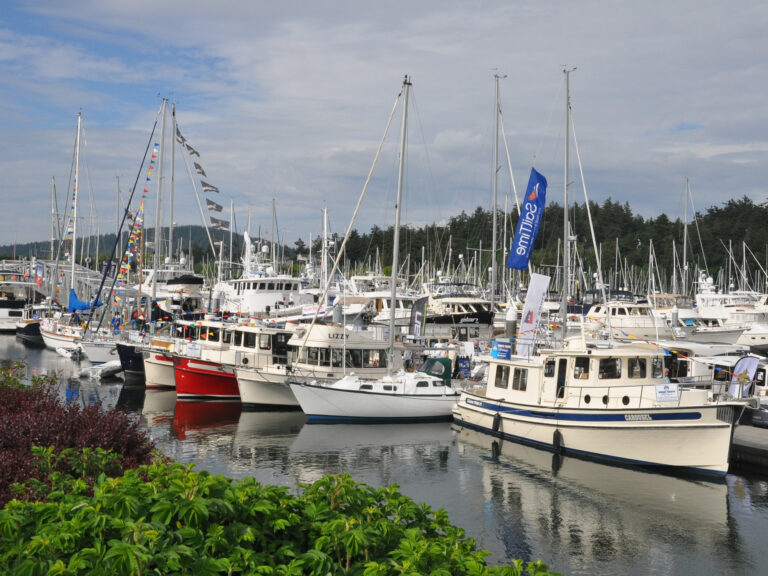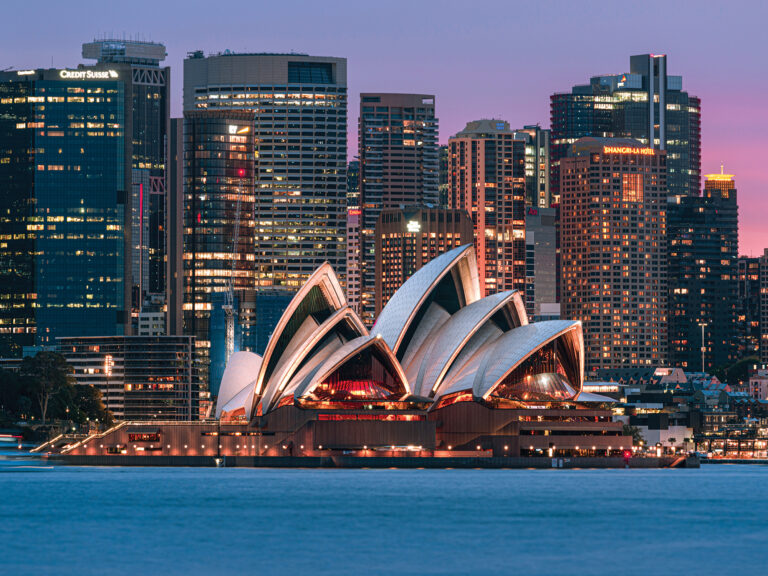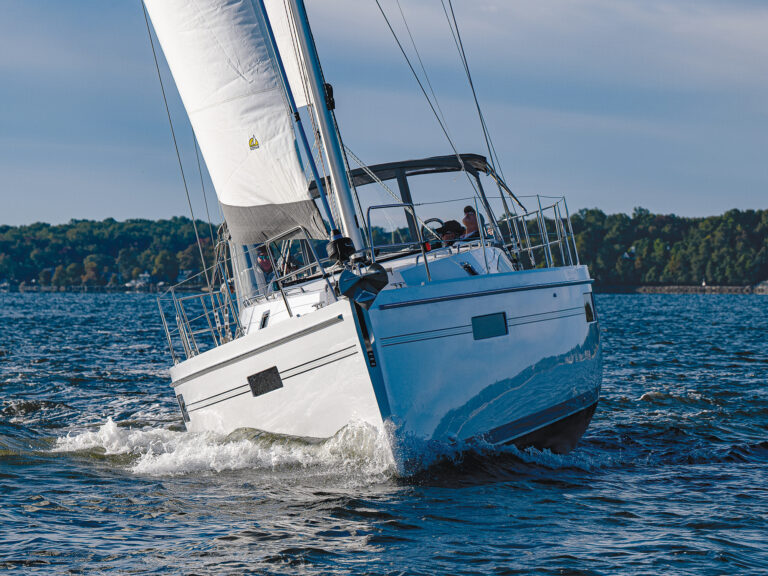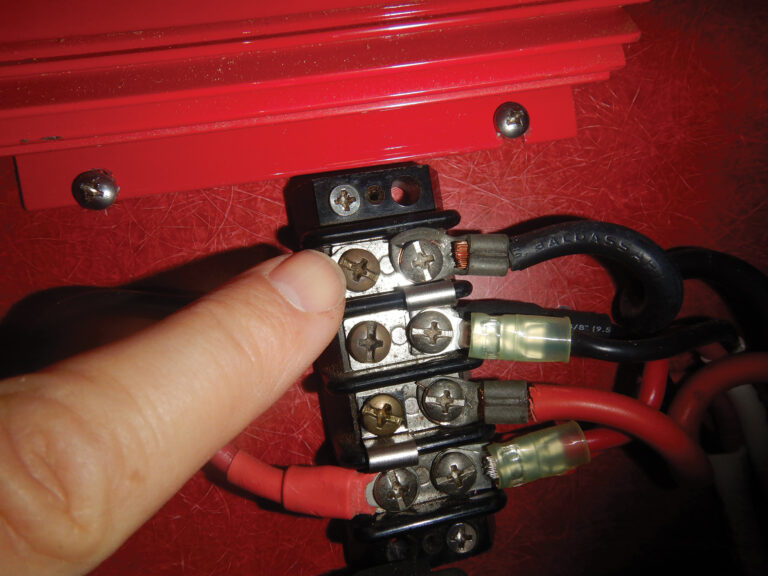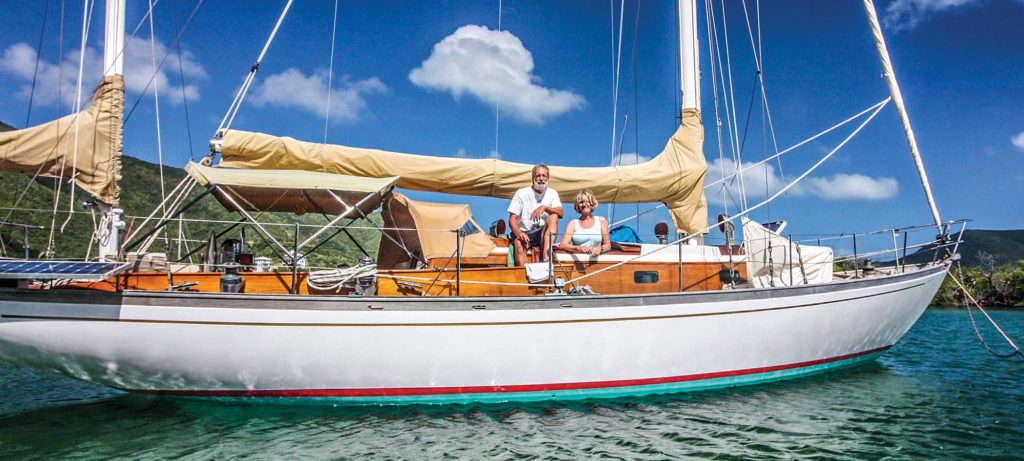
It is rare that we meet a cruising couple as enthralled with boats as Carolyn and I are. Lin and Larry Pardey come to mind. Don Street still cares. So do Alvah and Diana Simon, and Mike Litzow and Alisa Abookire. And, on the tiny island of St. John, in the U.S. Virgin Islands, where we are currently resting from the sea, there are Vicki Rogers and Thatcher Lord. Thatcher, a shipwright originally from Maine, is also a fine ship’s husband. Vicki knows her way around a brush, be it in the service of fine art (they have spent years living off her drawings) or simply to put that 10th coat of spar varnish on their sailboat’s perfectly prepped cap rail. Whenever we get together as couples, we talk boats. While we don’t always agree on specifics, we always admire our mutual passion. We have firm ideas based upon a lifetime of service to our hard-used craft, and we aren’t shy about sharing them. Sometimes it gets heated.
One of the reasons I’ve been thinking about all this is because we currently live in a yacht graveyard. Endless numbers of wrecks line the shore from Coral Bay to Cruz Bay in the U.S. Virgin Islands. It is estimated that more than 63,000 boats were lost or severely damaged during the 2017 hurricane season. Each holed hull cries out to us, every forlorn mast top poking up through placid harbor water stabs our hearts. We care, deeply. We just can’t bear to see noble boats savagely wounded. It insults who and what we are as lifelong sailors and yacht caregivers. What makes our concept of life, love and liberty so intertwined with boats and the sea? One factor is long-term involvement. Boats aren’t just a hobby, they are the centerpiece of our watery lives. We comb our hair in their reflection. You can judge us by our craft, and you can judge our craft by us. Thatcher’s father, Franklin, taught him how to sail and race. But he also taught him that boats own you as much as you own them, that true sailors are more custodians of their vessels than their dictatorial owners, that boats are, for some of us sea gypsies, a sacred responsibility.
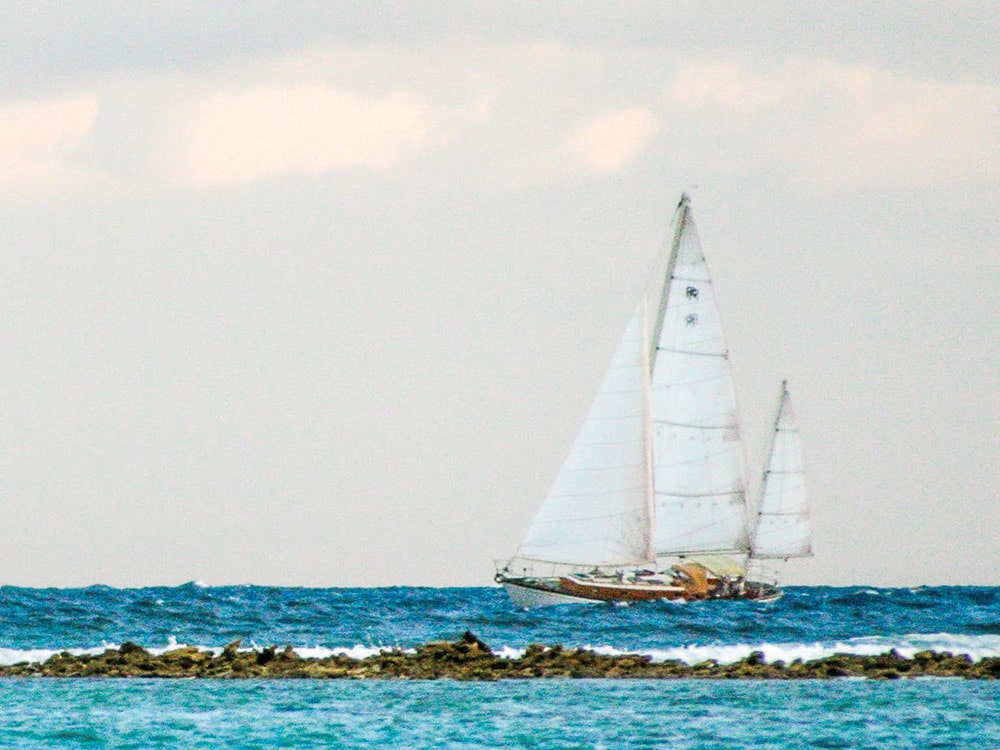
It’s a hard concept to put into words. I’ve thought about this for decades, with my pen poised over the page. The closest I can get is to say that certain sailors have the same compassion for their vessels as they do for their crews. This sets us apart, this romantic idea that we owe our boats something and that there is a sacred trust between us. This goes to the heart of what being a good ship’s husband is all about.
Thatcher purchased a rotten wreck of a boat while in his early 20s, not because there was any wood worth salvaging in its decayed bones but because it was an Alden design, built in the 1930s by Morse Brothers, of Thomaston, Maine. The boat had a spark he couldn’t allow to be snuffed out by time or circumstance.
Don’t even think about it,” as Thatcher hauled his beloved Bounty out of the water.
“I’ll be damned,” said the foreman when Thatcher relaunched the pristine wooden yacht a few years later.
During those years, Thatcher used to eat at a tiny in-yard restaurant staffed by special-needs adults, and met the young lady who organized the experimental self-empowerment effort. She started hanging around the building site, (purposely) getting more and more in the way.
One day, while Thatcher was climbing up the ladder with a plank in one hand and a wood plane in the other, Vicki asked, “What? I don’t even get a tour of the interior?” The rest, as they say, is his-and-her-story.
It is estimated that 63,000 vessels were lost or severely damaged by hurricanes in 2017. That’s a large number. Cap’n Fatty can’t quite get his head around it — what it means to the marine community, the industry or the sailors affected.
Carolyn and I met them while anchored in St. Augustine, Florida, in the early 1980s. I was immediately drawn to the boat. Vicki was alone in the cockpit. She answered every technical question I had without hesitation. I was impressed. But I was even more struck by how she said, “You’re going to love to meet my husband, Thatcher Lord.”
I admire a woman who loves unabashedly. In the ensuing 40 years of friendship, every time I’ve watched Vicki glance at Thatcher, I’ve seen her love for him shine through as bright as the sun.
We cruised in company through Florida, the Bahamas and, ultimately, the Lesser Antilles. When Thatcher started skippering giant sailing yachts, I was flown in for the ocean crossings. I called sail trim on their beloved Bounty during a dozen Wood Boat Regattas at Foxy’s Bar on Jost Van Dyke, in the British Virgin Islands. We raced together on some of the finest American yachts during Antigua Sailing Weeks, Rolex Cups and Heineken Regattas in St. Maarten.
Back in the day, my retirement idea was pretty simple: avoid dirt dwellers and the vexations of shore. It worked for Carolyn and me. But people are different. Vicki and Thatcher weren’t quite as fond of poverty as we were, so they decided to build a house on St. John and then rent it out so they could go cruising into the sunset without money worries.
It was a good plan and a long-term strategy that many of the folks reading this story might have today.
In order to afford the land and the materials to accomplish this dream, they sold Bounty to a wealthy entrepreneur. The new owner received a pristine, now famous-in-the-Caribbean yacht, and they got a pile of money. Thatcher banged his hammer above some dirt, and one of the nicest, most serene houses on St. John was conjured up, a home so tranquil it felt like a snug boat in a safe harbor.
But nothing is safe in the world. In fact, life itself can be viewed as one long risk assessment gone awry.
The first thing that went wrong was the deterioration of Bounty. Thatcher had reincarnated her, and couldn’t bear to witness her slow degradation.
“You sold her,” I’d say, and he’d glance away guiltily and mutter, “I know I did, Fatty, but, damn it!”
One day, Vicki called Thatcher with sad news, and he ran down to Round Bay. There was Bounty‘s mast forlornly sticking up from the water. She’d sunk. Thatcher asked me what to do.
“Do nothing,” I said, grimacing. “It’s not your problem.”
But Thatcher is Thatcher, and wouldn’t be if he could bear to see his beloved Bounty resting on the bottom. So, illegally, without permission and at his own expense of time, money and sweat, he raised her from the sea.
Then he went back to working on his house. As the building project finally wound down, he and Vicki purchased a derelict Rhodes 41 — a graceful, beautifully designed fiberglass 41-foot yawl — and began the long process of restoring it to better-than-new condition.
Thatcher doesn’t mess around. He took the Rhodes to bits. Over the course of several years, he replaced its wooden rudder, re-laid its teak deck and disassembled the wooden box spars and laboriously reglued them with epoxy. His attention and devotion to detail was amazing. He even wove new cane mats to mount behind the interior’s ventilation holes.
A decade or two went by, and Trinka, the Rhodes, became nearly as famous a classic as Bounty had been.
But fate wasn’t done with Thatcher. His boat’s halyards seemed as though they were jamming on something. He was having difficulty raising sail. Once he realized all the masthead sheaves were spinning freely, he went to Doc Clayton, had some tests done and then traveled to New York City for more exams.
Now, I’m not a physician and don’t understand exactly what kind of cancer it was, only that it was going to kill him unless he could come up with a bone marrow donor and go through a tricky, debilitating two-year medical procedure. Everyone in his family raised their hand.
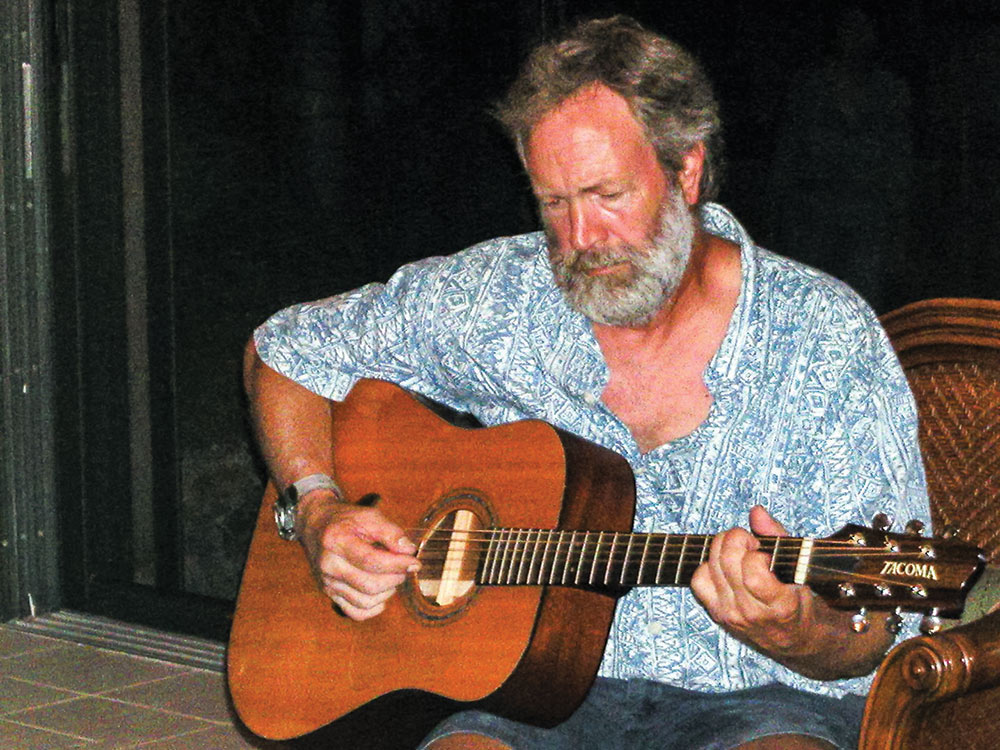
One of Thatcher’s sisters was a perfect match, and in the end, it all worked out. Hooray! He was cancer-free and perhaps might be called the luckiest man in the world. All he had to do at that point was to regain his strength and he’d be right back to where he was before the hospitals siphoned every cent from his pockets.
But so what of the dollars? Life is life, and life is precious. Modern miracles cost money. Who cares about their depleted bank account or their once sensible, logical, carefully implemented plan to go cruising into the sunset?
Still, the whole ordeal was a roller-coaster ride, I’ll tell you. Not just for Thatcher and Vicki but for their family and many dear friends. Then came last fall’s hurricanes Irma and, soon thereafter, Maria. It doesn’t matter which one sank Trinka — or which one damaged the house. It matters only that as the storms sputtered out, the flooding ceased and the rain stopped, Vicki and Thatcher were financially back where they’d been when he’d happily taken her hand to help her up Bounty‘s ladder.
So you see, dear readers, I don’t have time to grieve over those 63,000 sunken or destroyed boats. I’m too busy worrying about friends. And I guess Thatcher still values my opinion because he invited me down to Bjork Creek to survey and assess the damage to his sunken craft.
I looked at those masts sticking up out of the water and wanted to cry. I wanted to tell Thatcher something jaunty and hopeful to make him laugh. He’d had a rough patch.
But I couldn’t. I couldn’t lie. Trinka had been underwater too long. Its box spars were already beginning to delaminate, the new teak decks to curl. The sailboat was worthless, and that wasn’t even mentioning the large hole in the hull, the rusted-tight engine or all the ruined electro-doodads.
“Walk away,” I said coldly, staring at the masts. “It will take years in the yard, Thatch. We’re too old. We don’t have that many years left.” Then, I heard a terrific grunting sound behind me, someone straining with all their might. I turned to look.
There were scuba tanks standing beside Thatcher’s pickup, and he was laboriously dragging some yellow air bags through the mangroves. I shivered. He was going to raise her — a sacred trust.
The Goodlanders wintered over in the Virgin Islands, readying their Wauquiez Amphitrite Ganesh for its next round-the-world adventure. Fatty’s latest book, Cruising Boat Basics, is now available at Amazon.

